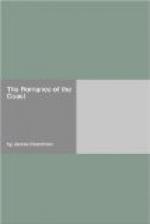The first time I saw my poor friend I liked him. We lived in a lonely house that stood on the cliffs at a bleak turn of the coast. One wild morning a coble beat into our cove. It looked as though the sea must double on her every second; but just when the combers shot at her most dangerously the man at the tiller placed the broad square stern at right angles to the path of the travelling wave, and she lunged forward safely. By dexterous jockeying she was brought close in, and the men came through the shallow water in their sea-boots. They were blue with cold, and begged for a little tea or coffee. Hot cakes and coffee happened to be just ready; so the fellows had a hearty breakfast and went away. With prolonged clumsiness the pilot shook the hand of the lady who had entertained him; and in two days after the boat sailed into the cove again amid nasty weather, and the master came ashore with a set of gaudy wooden bowls painted black and red. These he solemnly presented to the lady of the house. He had run thirty miles against a northerly sea to bring them.
When I next saw the pilot he had fallen upon very hard times. The system of keeping “privileged men” had obtained great hold in the north. The privileged pilot does not need to go out and beat about at sea in search of vessels; he can lie comfortably in his bed until he is signalled, and then he steps aboard without any of the trouble of competition. However good this system may be in a general way, it bears very hardly on the poor fellows who have to lie off for two or three days together on the chance of getting a ship. We were passing by Flamborough Head in a large steamer when the mate came down below and said, “There is a pilot-boat from our town astern there, sir.” The captain shouted, “Tell them to stop her directly and take the coble in tow.” We then blew our whistle, and the pilot-boat drew up alongside. My friend stepped aboard, and the captain said, “Come away down and have some breakfast.” The pilot tried to speak, but his voice broke. He said: “No, I can’t eat. When you passed us, we baith started to cry; and when you whistled for us, maw heart com’ oot on its place, an’ it’ll gan back ne mair.” The poor men had had no food for two days. In spite of his tragic statement, the pilot recovered, and ate a very good breakfast indeed; and his boat towed astern of us till he placed us at our moorings.




